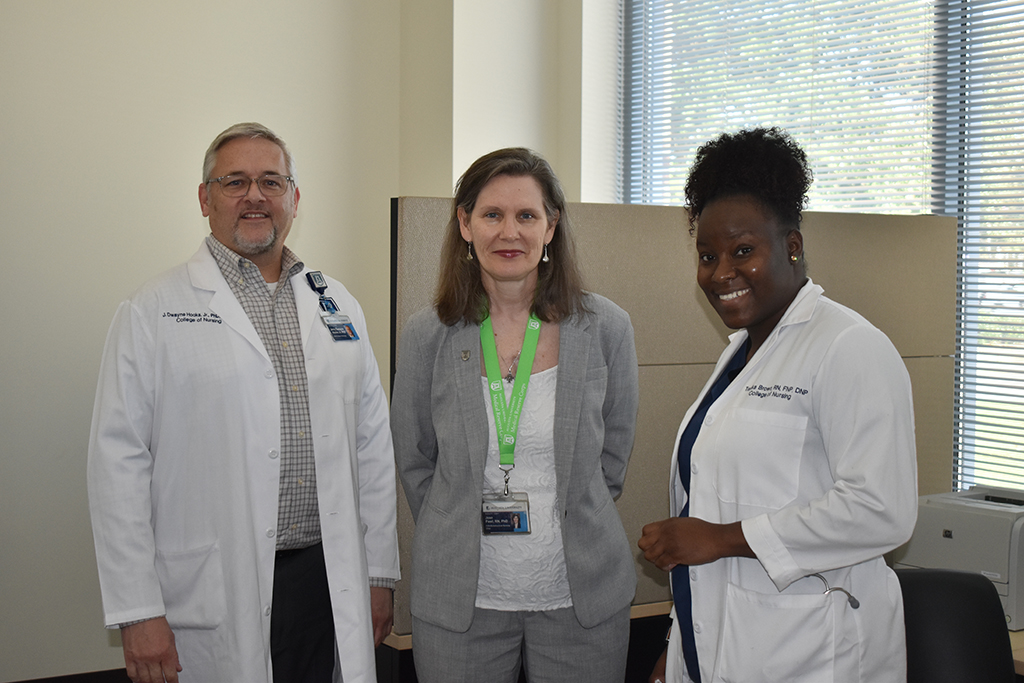Augusta University’s College of Nursing received grant funding worth almost $1.5 million for the next three years, provided by the Health Services Resource Administration (HRSA). Dr. Jean Pawl said the grant focuses on Behavioral Health Integration (BHI) into the primary care setting.
The purpose of the I.C. Team (BHI) grant is to increase access to quality integrated behavioral health services. More than 10 million people currently live in Georgia; of those, about 2 million adults have a mental illness and 300,000 have serious mental illness. Georgia ranks last in the nation for access to mental health care and 41st in the nation for access to primary care. Pawl, department chair for the Department of Biobehavioral Nursing, also notes that more than half of Georgia’s 159 counties do not have adequate primary care services to meet community needs.
Pawl also said 26% of rural residents do not seek treatment when experiencing symptoms because they can’t afford a visit, there is no provider to accept their insurance, there is too much distance to a provider, and/or appointment times do not to fit their schedule. To help ameliorate the access issue, the BHI concept is about providing primary care services and mental health all in one location rather than a patient having to seek multiple settings for care. The team works collaboratively to provide all services as needed.
In collaboration with Dr. Dwayne Hooks, clinical director of the Nurse-Managed Health Center, Pawl said the outcomes of the grant include creating and sustaining school-based and community-based partnerships for the provision of technology-enhanced integrated care based out of the Nurse-Managed Health Center.
Another outcome includes assessing and evaluating data while creating and revising best practices in providing integrated care. The care team includes family nurse practitioners, psych mental health nurse practitioners, a registered dietician, a social worker, and two physicians who are based in family medicine and psychiatry. As the program evolves, interprofessional instruction will be implemented for health care professionals to identify, refer, and provide care for individuals in rural or underserved areas in Georgia. Currently in Phase I, boards of education in Taliaferro, Richmond and Burke counties are partnered organizations.
“The grant will be used to purchase equipment to connect services with our partners and to support salaries of the nurse practitioners and other support personnel,” Pawl said. “We will have two consultants who provide BHI in Albany, Georgia, work with us while we initiate our integrated care in the College of Nursing Nurse-Managed Health Center.
Dr. Tranika Brown, the lead primary care provider in the Nurse-Managed Health Center, is fully aware of the negative impact that adverse childhood experiences and chronic disease can have on overall mental health. A collaboration that addresses the physical, behavioral, and dietary needs of patients and families is a rare opportunity to provide much-needed holistic care. Additionally, such an opportunity will yield great teaching moments for our AU nursing students.
Dr. Vincent Pair, a registered dietician, understands the cornerstone that nutrition provides and the importance of integrated care when medical diagnoses and pharmacotherapuetics may perpetuate alterations in nutrition status. It is an imperative facet not only for development, but also to maintain health status. This is further compounded in the at-risk populations that the grant looks to serve.
“Although there are other services provided in some of the identified partners, ours is unique in providing combined services: there are plenty of care needs without having to compete for care,” Pawl added. “We were excited to learn that we were one of 12 recipients of these funds in the nation and look forward to meeting a dire need in Georgia.”
 Augusta University
Augusta University




